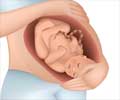
‘Exposure to light during night shifts disrupts circadian rhythm and decreases the release of melatonin, which is integral in maintaining a successful pregnancy.’
Tweet it Now
For this study the authors accessed payroll data on 22,744 pregnant women working in public services, mainly hospitals, in Denmark, and linked that with data from Danish national registers on births and admissions to hospital for miscarriage to determine how the risk of miscarriage between weeks 4-22 of pregnancy was influenced by night work. Overall 377,896 pregnancy weeks were included - an average of 19.7 weeks per woman.
After week eight of pregnancy, women who had worked two or more night shifts the previous week had a 32% higher risk of miscarriage compared with women who had not worked any night shifts that week.
And the risk of miscarriage increased with the number of night shifts worked per week and also by numbers of consecutive night shifts.
The association between night work and the risk of miscarriages was stronger after pregnancy week 8. "This may be explained by the decline in the proportion of chromosomally abnormal fetuses with gestational age, which makes an association with environmental exposure more easily detectable among later miscarriages," the authors say.
Advertisement
But, as around 14% of women in Europe report working at night at least once a month, the findings have relevance for working pregnant women as well as their employers, physicians and midwives, they emphasize. "Moreover, the results could have implications for national occupational health regulations."
Advertisement
Source-Eurekalert














